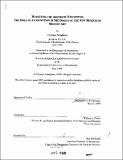| dc.contributor.advisor | William L. Porter. | en_US |
| dc.contributor.author | Caloghirou, Christina, 1971- | en_US |
| dc.coverage.spatial | n-us-ma | |
| dc.date.accessioned | 2011-07-18T14:01:39Z | |
| dc.date.available | 2011-07-18T14:01:39Z | |
| dc.date.copyright | 1998 | en_US |
| dc.date.issued | 1998 | en_US |
| dc.identifier.uri | http://hdl.handle.net/1721.1/64902 | |
| dc.description | Thesis (M.S.)--Massachusetts Institute of Technology, Dept. of Architecture, 1998. | en_US |
| dc.description | Includes bibliographical references (p. 140-143). | en_US |
| dc.description.abstract | In recent years, museum architecture has been extensively subjected to cultural critique. Perceived as an instance of architects' stylistic yearnings, reflecting control strategies, promoting institutions' economic and cultural power, catering for education through forms that increasingly associate it with commercial environments and building structures, museum architecture is examined in this thesis as a significant ground for articulating the relation between cultural and consumer practices. Assuming that contemporary societies increasingly operate within a highly consumptive culture, where people seek new experiences through travel, leisurely activities and cultural exposure, and considering that the physical environment challenges and affects the perception of our material and immaterial worlds, we investigate the role of consumption in recent museum design. In so doing, this study focuses on the new expansion of the Museum of Modern Art in New York, a project that surprised critics both in its choice of participants and the conceptualization of its design process. We discuss the meaning of consumer culture in the context of cultural institutions, outline its effect on the definition of MoMA's institutional identity and study its role and expression in the conceptual and design phases towards the selection of the final project. The objective is to review and expand our understanding of the relationship between consumption and cultural production in museum spaces while aspiring to develop an operative framework for future thought and practice in the shaping of new architectural identities. | en_US |
| dc.description.statementofresponsibility | by Christina Caloghirou. | en_US |
| dc.format.extent | 143 p. | en_US |
| dc.language.iso | eng | en_US |
| dc.publisher | Massachusetts Institute of Technology | en_US |
| dc.rights | M.I.T. theses are protected by
copyright. They may be viewed from this source for any purpose, but
reproduction or distribution in any format is prohibited without written
permission. See provided URL for inquiries about permission. | en_US |
| dc.rights.uri | http://dspace.mit.edu/handle/1721.1/7582 | en_US |
| dc.subject | Architecture | en_US |
| dc.title | Marketing the aesthetic encounter : the role of consumption in the design of the new Museum of Modern Art | en_US |
| dc.title.alternative | Role of consumption in the design of the new Museum of Modern Art | en_US |
| dc.type | Thesis | en_US |
| dc.description.degree | M.S. | en_US |
| dc.contributor.department | Massachusetts Institute of Technology. Department of Architecture | |
| dc.identifier.oclc | 40154532 | en_US |
